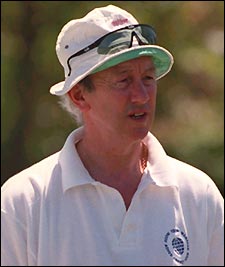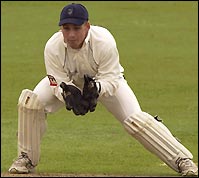The Rediff Interview / Bob Taylor
'The wicket-keeper is the second
main person of the team'
 There was little to choose between Alan Knott and Bob Taylor when it came to wicket-keeping. Taylor played just 57 Tests for England, only because he was a contemporary of the all-time great Knott.
There was little to choose between Alan Knott and Bob Taylor when it came to wicket-keeping. Taylor played just 57 Tests for England, only because he was a contemporary of the all-time great Knott.
Playing for English county Derbyshire between 1961 and 1983, he claimed 1,473 catches and 176 stumpings -- a world record for dismissals in a career.
The former England wicket-keeper was in Mumbai to conduct a workshop for 25 of India's best wicket-keeping talent (including Parthiv Patel and Deep Dasgupta). In the first of a two-part interview, he speaks to Ashish Magotra about the art of 'keeping.
What is the most important thing about wicket-keeping?
The most important thing about wicket-keeping, obviously, is concentration. It is with any aspect of the game, whether you are a batsman, bowler or wicket-keeper, because the wicket-keeper, I think, is the second main person of the team. The first is, obviously, the captain, because he is in charge; but the second most important person is the wicket-keeper because he is the motivator. If you look, historically, the most successful teams, whether they are at Test, county or club level, they all have very good fielding sides and those very good fielding sides are based around a very good wicket-keeper. The old adage that "catches win matches" is very true. The most successful teams catch more catches, take more chances.
You have talked a lot about concentration, but many people also talk about a wicket-keeper having 'soft hands', being a natural, the way he moves behind the stumps. How much of a difference does that make? Is it possible for a wicket-keeper to keep improving?
I think at Test level, it is probably natural. It's a natural gift, whereas the 'soft hands' is always a compliment. If a press chap says: 'You have soft hands,' that means you could hardly hear the ball go into your gloves. A lot of people think 'soft hands' means that the actual texture of your hands is soft, but it means that the ball sinks into your gloves and you don't hear a sound. It's probably a gift. I think you can work at it.
The three qualities of a wicket-keeper are:
1. Concentration: That's a priority; expecting the ball to come to you. Imagine the bowler is bowling at you and not the batsman.
2. Staying down: You got to try and stay down as long as possible.
3. Giving with the ball: Letting the ball come to you, having 'soft hands'.
Of the three priorities, concentration has got to be number one because you can have the best pair of hands in the world, the softest pair, but if your mind isn't concentrating on the job at hand, the ball will go down. It will enter the gloves and go down because you are not concentrating properly.
The most difficult part for a wicket-keeper in concentration: it's easy for me to say to an individual, 'Expect the ball to come through to you'. Imagine the bowler is bowling at you. There is a batsman is front of him with a bat and he is going to hit the ball. But that is the only way I know and that is what I have told all the boys. When the batsman plays the ball, the wicket-keeper must go through the motions of having imagined the ball come through to him. The batsman is going to play the ball a lot of times when it doesn't come through to the wicket-keeper. Every time he plays the ball the wicket-keeper has got to go through the motions of having taken it and then he can look up and see where the ball has been hit. Not until.
 How many times have we seen the spin bowler bowling, the batsman goes out of his crease to hit a six, his head goes up, he misses the ball. The two mistakes a wicket-keeper makes is that from his crouched position he rises too soon and a lot of junior wicket-keepers tend to bring their arms by their waist.
How many times have we seen the spin bowler bowling, the batsman goes out of his crease to hit a six, his head goes up, he misses the ball. The two mistakes a wicket-keeper makes is that from his crouched position he rises too soon and a lot of junior wicket-keepers tend to bring their arms by their waist.
Now, if the ball keeps low it goes through; it's four byes or, if you are lucky, it might hit your pads and bobble down. That's the first mistake: getting up too soon and their arms going up. What you should do is when you rise from the crouched position is leave your arms extended and keep your hands below the knees so if the ball keeps low you are in a position to take it, and if it bounces it is easier to come up. Once you have committed yourself to coming up, you can't get down again, not even to a slow bowler; the ball comes in too quickly and it will beat you.
The second mistake is when the batsman goes out of his crease. The wicket-keeper, first of all, comes up too soon, his arms raised. He then looks as to where the batsman is going to hit the ball, so he is looking there, his eyes are there and the ball comes through; four byes.
And how many times have we seen the batsman two yards out of his crease, the ball comes through. If the wicket-keeper is lucky, it hits his pad. The wicket-keeper then scrambles to get the ball and break the wicket by which time the batsman is safely back in the crease.
If you get into the habit of keeping your head and eyes focused on the cut area of the wicket, then it becomes second nature, just like riding a bike, like swimming. Once you have learned to ride a bike or swim you do it automatically. So, consequently, if you get into the habit of taking the ball, every time the batsman plays the ball, when he does miss the ball and he is out of his crease, you are half there, going to take the ball. That is a very key part of keeping wickets. That's is the only practical way I know of improving your concentration.
Is there any particular technique you have suggested other than just going through the motions of wicket-keeping every ball?
No, basically it's just hard work and practice. Practice makes perfect. And I have said to these boys we have had problems as Test match wicket-keepers. Kiran More (who was also there at the workshop), Syed Kirmani or Ian Healy, or whoever it is, and I have talked to them. They always have problems getting their practice, because the batsmen want their practice in the nets; the bowlers want theirs; then they want the fielding practice. And then they are all tired. They have all done their work.
Unless the wicket-keepers have their own coach or if there are two or three wicket-keepers to help one another, it is very difficult.
Have you suggested that India have a specialist wicket-keeping coach?
Well, the England football team, under Sven Goran Eriksson, has goalkeeping coaches. The goalkeepers are a vital part of the football team. The wicket-keeper is a vital part of the cricket team and it's a specialist position. There is only one wicket-keeper and I think there should be emphasis on coaching the wicket-keeper, because he gets more chances, more catches, more stumpings than any other fielder. So he is a vital part.
Who do you think is the best wicket-keeper around?
I think that Mark Boucher is being given the chance and I think he is developing into a good all-round wicket-keeper. These days wicket-keepers have to bat. The main reason I think that I played 57 Tests for England was the fact that I was a wicket-keeper/batsman, not a batsman/wicket-keeper. I was a pure wicket-keeper/batsman. One of the main reasons was that fact that England had Ian Botham. Now, Ian Botham was a genuine all-rounder, who batted number 6; sometimes number 7 would get you runs. He would then go out and get wickets with his bowling. A very strong character and a very strong personality. So England, when Botham played, could afford to play me as a pure wicket-keeper.
Now we have seen Jack Russel for England having to retire. Because Alec Stewart has kept him out and Russel was developing into a good all-round cricketer. If I was playing in this day and age, I wouldn't play because I was a pure wicket-keeper.
And India, I wouldn't say are falling into the trap. No disrespect to Rahul Dravid; they are playing Dravid as a wicket-keeper... a back-stopper. I don't really know; I haven't seen him keep that much. But I always think when you are picking the formation of the cricket team, after the captain I have already said the wicket-keeper is priority.
If Rahul misses a chance off a batsman and he goes on to get a hundred, a big score, then he's got to make a big score to make up for it. It doesn't always work out that way. I know it's a temptation for the captain to be able to pick an extra batsman or an extra bowler, and that's why they leave the wicket-keeper out. But, personally, I think it's a mistake.
Part II: Bob Taylor names his all-time best wicket-keeper
Interviews
Mail Cricket Editor